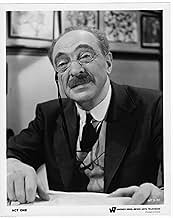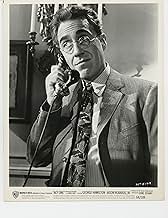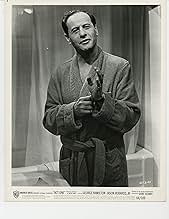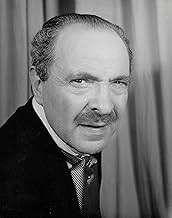Story of the life of writer/playwright Moss Hart.Story of the life of writer/playwright Moss Hart.Story of the life of writer/playwright Moss Hart.
Jonathan Goldsmith
- Teddy Manson
- (as Jonathan Lippe)
- Director
- Writers
- All cast & crew
- Production, box office & more at IMDbPro
6.0317
1
2
3
4
5
6
7
8
9
10
Featured reviews
dull
It's 1929. Moss Hart (George Hamilton) is a young struggling playwright in Brooklyn. He writes five serious plays but there is no taker. Joe Hyman (Jack Klugman) is his best friend and tireless supporter. He teaches a class where he befriends student Lester Sweyd (George Segal). Eventually, he comes up with a comedy about the transition into movie talkies. It attracts director George S. Kaufman (Jason Robards).
George Hamilton has a deliberate speaking style which gives the performance lesser intensity. He should be a desperate man but I only sense that in a couple of scenes. He's the opposite of the emotional acting of James Dean. There is a sense of staleness to the movie. The guys are doing some kind of Algonquin Round Table without the witty banter and sharp takedowns. It's an autobiography of Moss Hart but it could take some liberties if only to inject some drama into this dull production.
George Hamilton has a deliberate speaking style which gives the performance lesser intensity. He should be a desperate man but I only sense that in a couple of scenes. He's the opposite of the emotional acting of James Dean. There is a sense of staleness to the movie. The guys are doing some kind of Algonquin Round Table without the witty banter and sharp takedowns. It's an autobiography of Moss Hart but it could take some liberties if only to inject some drama into this dull production.
The Creative Process
Four years before his death in 1961 Moss Hart wrote his incredibly successful autobiography Act One where he detailed the story of his life as the son of a cigar maker until the opening night of his first Broadway success, Once In A Lifetime. The film skips all of his childhood and early adulthood and concentrates on the creation of that first success and the process that went into it.
With Dore Schary producing and directing the film for Warner Brothers it certainly could be said that this was someone who knew the creative process and could empathize with Moss struggling to write that first success, accepting the help of George S. Kaufman who had already achieved success on Broadway as a collaborator with such folks as Morrie Ryskind and Edna Ferber and Marc Connelly. Two heads are often better than one when it's right two heads.
As this was written way before Stonewall, the gay side of Moss Hart was certainly not explored. Moss Hart married Kitty Carlisle and they did have two children, but Moss was forever a man on the prowl as any number of Broadway folks could have attested to back in the day. Young George Hamilton may not have looked Jewish, but he certainly gave off some attractive vibes.
With his hair styled as a straight up flat top and a pair of glasses, Jason Robards, Jr. was the spitting image of George S. Kaufman who probably put more wit into the mouths of actors than anyone else in the last century, not to mention some of the offhanded cracks he was credited with. Ruth Ford played a sympathetic first wife who was soon to be an injured innocent party when Kaufman got dragged into Mary Astor's divorce case via her diary. According to her Kaufman had more than wit available in his arsenal.
Eli Wallach puts in an appearance as a producer who was supposed to be based on Jed Harris who was one of the most disliked men on Broadway, the spiritual father of David Merrick later on. He doesn't get much to work with so it's not one of his better portrayals.
You also had to love that delicatessen round-table that included such folks as Jack Klugman, George Segal, and Bert Convy playing a young actor named Archie Leach. As Cary Grant said in His Girl Friday, no one ever heard from him again. Sort of a warm up for Hart of the famous Algonquin round-table where he and Kaufman were charter members.
Moss Hart probably came along at one of the peak times for creativity in the American theater and he became a very big part of it. He also got over his distaste for musicals being associated with quite a few good ones in his time, the last being Camelot. Maybe had he lived we might have seen an Act Two. But his whole life was one big creative process.
With Dore Schary producing and directing the film for Warner Brothers it certainly could be said that this was someone who knew the creative process and could empathize with Moss struggling to write that first success, accepting the help of George S. Kaufman who had already achieved success on Broadway as a collaborator with such folks as Morrie Ryskind and Edna Ferber and Marc Connelly. Two heads are often better than one when it's right two heads.
As this was written way before Stonewall, the gay side of Moss Hart was certainly not explored. Moss Hart married Kitty Carlisle and they did have two children, but Moss was forever a man on the prowl as any number of Broadway folks could have attested to back in the day. Young George Hamilton may not have looked Jewish, but he certainly gave off some attractive vibes.
With his hair styled as a straight up flat top and a pair of glasses, Jason Robards, Jr. was the spitting image of George S. Kaufman who probably put more wit into the mouths of actors than anyone else in the last century, not to mention some of the offhanded cracks he was credited with. Ruth Ford played a sympathetic first wife who was soon to be an injured innocent party when Kaufman got dragged into Mary Astor's divorce case via her diary. According to her Kaufman had more than wit available in his arsenal.
Eli Wallach puts in an appearance as a producer who was supposed to be based on Jed Harris who was one of the most disliked men on Broadway, the spiritual father of David Merrick later on. He doesn't get much to work with so it's not one of his better portrayals.
You also had to love that delicatessen round-table that included such folks as Jack Klugman, George Segal, and Bert Convy playing a young actor named Archie Leach. As Cary Grant said in His Girl Friday, no one ever heard from him again. Sort of a warm up for Hart of the famous Algonquin round-table where he and Kaufman were charter members.
Moss Hart probably came along at one of the peak times for creativity in the American theater and he became a very big part of it. He also got over his distaste for musicals being associated with quite a few good ones in his time, the last being Camelot. Maybe had he lived we might have seen an Act Two. But his whole life was one big creative process.
Good intentions, limited appeal
Playwright Moss Hart delighted readers with his bestselling memoir of his early career. But when producer Dore Schary turned the book into a script after Hart's death, something got lost. This is a bland movie. While people interested in the literary scene of the 1920s will surely enjoy watching it, there's not much to enthrall the average viewer.
George Hamilton plays the young Hart, a talented guy with big dreams and little money. His close-knit Jewish family inspires him to push on with his writing career, but his equally penniless friends can sometimes be more discouraging than supportive.
After many disappointments trying to market his plays, Hart gets a foot in the door when the famed George S. Kaufman agrees to collaborate with him. But Hart soon finds that writing as part of a team can be harder than working alone. Jason Robards Jr., as the maddeningly eccentric Kaufman, is the best part of this movie.
"Act One" is about a man's struggle to come up with a good story to tell, but the story it tells is disappointingly weak. Especially in the early portion, it seems more like a series of anecdotes than a narrative. That may be because the film was adapted from a memoir, but a better writer than Schary might have been able to make it flow better.
Besides Kaufman, there are lots of real historical personages portrayed in the film, such as writers Dorothy Parker and Alexander Woollcott and actor Archie Leach, who would later become film star Cary Grant. But they come and go so fast that the effect is often more like name dropping than characterization. Some of them don't even have any lines. (Bert Convy does have a few lines as Leach, but he speaks them without a trace of a British accent.)
Despite its flaws, this picture will appeal to viewers who are really interested in the people and events depicted. Otherwise it's hard to recommend as entertainment. Though it gets considerably better, more intense, toward the end, I suspect that many people won't stay with it that long.
George Hamilton plays the young Hart, a talented guy with big dreams and little money. His close-knit Jewish family inspires him to push on with his writing career, but his equally penniless friends can sometimes be more discouraging than supportive.
After many disappointments trying to market his plays, Hart gets a foot in the door when the famed George S. Kaufman agrees to collaborate with him. But Hart soon finds that writing as part of a team can be harder than working alone. Jason Robards Jr., as the maddeningly eccentric Kaufman, is the best part of this movie.
"Act One" is about a man's struggle to come up with a good story to tell, but the story it tells is disappointingly weak. Especially in the early portion, it seems more like a series of anecdotes than a narrative. That may be because the film was adapted from a memoir, but a better writer than Schary might have been able to make it flow better.
Besides Kaufman, there are lots of real historical personages portrayed in the film, such as writers Dorothy Parker and Alexander Woollcott and actor Archie Leach, who would later become film star Cary Grant. But they come and go so fast that the effect is often more like name dropping than characterization. Some of them don't even have any lines. (Bert Convy does have a few lines as Leach, but he speaks them without a trace of a British accent.)
Despite its flaws, this picture will appeal to viewers who are really interested in the people and events depicted. Otherwise it's hard to recommend as entertainment. Though it gets considerably better, more intense, toward the end, I suspect that many people won't stay with it that long.
interesting story not very well done
Moss Hart wrote one of the great books on theater, Act One, and here it's turned into a film starring George Hamilton as Hart.
The film also features Jason Robards as George S. Kaufman, Eli Wallach as a producer, George Segal as Hart's friend Lester, Sam Groom as a student, Ruth Ford as Mrs. Kaufman, Jack Klugman as a good friend to Moss, and Bert Convy as "Archie Leach," another friend, whom film fans know became Cary Grant.
The story goes from Hart's days as a young, serious playwright to the Broadway opening of Hart's first play, "Once in a Lifetime," co-written with George S. Kaufman. They became one of the finest Broadway writing teamsin theater history.
George Hamilton is a handsome man who has become a wonderful parody of himself and his tan in later years. He was never really much of an actor though he does an okay job here.
Someone certainly thought a lot of his looks here - he is photographed in closeup with a special light in his eyes, the kind designed for Dirk Bogarde in the '50s.
I don't know if Dore Schary, the director, had a limited budget or what, but casting Bert Convy as Cary Grant was such an insult to probably the biggest male film star of all time. Convy was nice looking, but he made no attempt at an accent. The problem is, it was too small a part to cast someone like John Gavin.
The rest of the performances were fine, but Jason Robards as Kaufman was a true standout. Wallach didn't have much to do.
The film has been criticized for being too sentimental. I didn't find it sentimental, I found it unexciting, when there's probably nothing more exciting than preparing a show for Broadway.
It's possible that the book wasn't really adaptable as a movie. It's hard to make writing exciting on screen. Hart was a huge talent who wrote some fabulous plays. I just don't think that somehow, his story made for an impressive film.
The film also features Jason Robards as George S. Kaufman, Eli Wallach as a producer, George Segal as Hart's friend Lester, Sam Groom as a student, Ruth Ford as Mrs. Kaufman, Jack Klugman as a good friend to Moss, and Bert Convy as "Archie Leach," another friend, whom film fans know became Cary Grant.
The story goes from Hart's days as a young, serious playwright to the Broadway opening of Hart's first play, "Once in a Lifetime," co-written with George S. Kaufman. They became one of the finest Broadway writing teamsin theater history.
George Hamilton is a handsome man who has become a wonderful parody of himself and his tan in later years. He was never really much of an actor though he does an okay job here.
Someone certainly thought a lot of his looks here - he is photographed in closeup with a special light in his eyes, the kind designed for Dirk Bogarde in the '50s.
I don't know if Dore Schary, the director, had a limited budget or what, but casting Bert Convy as Cary Grant was such an insult to probably the biggest male film star of all time. Convy was nice looking, but he made no attempt at an accent. The problem is, it was too small a part to cast someone like John Gavin.
The rest of the performances were fine, but Jason Robards as Kaufman was a true standout. Wallach didn't have much to do.
The film has been criticized for being too sentimental. I didn't find it sentimental, I found it unexciting, when there's probably nothing more exciting than preparing a show for Broadway.
It's possible that the book wasn't really adaptable as a movie. It's hard to make writing exciting on screen. Hart was a huge talent who wrote some fabulous plays. I just don't think that somehow, his story made for an impressive film.
Less than stellar offering from Dore Schary
Although I recognized the name Moss Hart, I had to do some quick research to learn exactly why it rang a bell. I've never read the source material, so I can't comment on any correlation between the film and book. This review is based solely on my take on the movie in and of itself.
It pains me to write that this film is like drinking a glass of tepid water. It will keep you hydrated, but the impact on the taste buds is negligible. Just when I wanted to rate it a 5.1, something would bump it back to a 4.9. But then this is typical of a Schary project that never seems to rise above.
Hamilton does his best with what he has to work with. Robards isn't given much of a meaty role, but he delivers. I enjoyed Klugman's performance the most. Sylvia Straus, as Hamilton's mother, does a fine job, too.
What I like best about the film is that it does give a glimpse into just how hard it is to achieve major success in the entertainment industry, as told from the point of view of someone already making a semi-living in the business. The tales about an artist being plucked from obscurity and becoming an overnight, wildly successful sensation are fun but don't truly represent reality. Many, many people work for years and years and never witness the accolades due them, regardless of occupation.
This movie shows what happens if you don't give up. Unfortunately, it does so in an unforgettable, bland, and slightly boring fashion. Don't expect too much from it.
It pains me to write that this film is like drinking a glass of tepid water. It will keep you hydrated, but the impact on the taste buds is negligible. Just when I wanted to rate it a 5.1, something would bump it back to a 4.9. But then this is typical of a Schary project that never seems to rise above.
Hamilton does his best with what he has to work with. Robards isn't given much of a meaty role, but he delivers. I enjoyed Klugman's performance the most. Sylvia Straus, as Hamilton's mother, does a fine job, too.
What I like best about the film is that it does give a glimpse into just how hard it is to achieve major success in the entertainment industry, as told from the point of view of someone already making a semi-living in the business. The tales about an artist being plucked from obscurity and becoming an overnight, wildly successful sensation are fun but don't truly represent reality. Many, many people work for years and years and never witness the accolades due them, regardless of occupation.
This movie shows what happens if you don't give up. Unfortunately, it does so in an unforgettable, bland, and slightly boring fashion. Don't expect too much from it.
Did you know
- TriviaFirst film role of Jonathan Goldsmith (as Jonathan Lippe), who portrayed Teddy Manson, and who is now much better known as "The Most Interesting Man in the World" from Dos Equis beer TV commercials.
- GoofsIn the opening scene, set in September 1929, Moss Hart turns on his radio to listen to a news report by Jimmy Wallington. One of the stories features an error as Wallington reports "Colonel Theodore Roosevelt returned to New York yesterday from a 10-month expedition in China...the former President was in excellent spirits..." This would have been impossible as President Theodore Roosevelt died 10 years earlier. However, his sons Theodore Roosevelt Jr. (a brigadier general in the Army) and Kermit Roosevelt did, in fact, make a 10-month expedition to China between 1928 and 1929.
The radio also reports that the New York Yankees defeated the Detroit Tigers 9-3 the previous day, but the game occurred two days earlier and the previous day's game had been postponed because of rain. The news report is read nearly verbatim from the New York Times' account of the game.
- Crazy credits"Curtain" (instead of "The End")
- ConnectionsReferenced in I've Got a Secret: George Hamilton (1963)
Details
- Runtime
- 1h 50m(110 min)
- Color
- Aspect ratio
- 1.66 : 1
Contribute to this page
Suggest an edit or add missing content

































